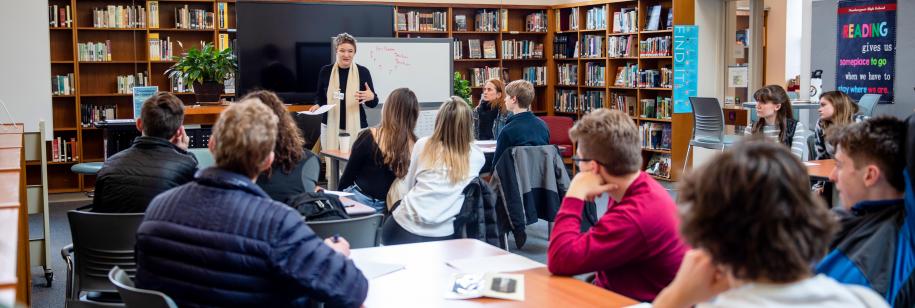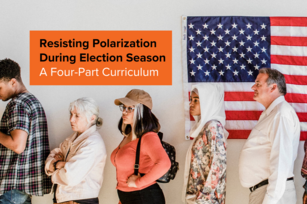
Breadcrumb
- Essential Partners
- Who We Work With
- Middle & High Schools
- Dialogic Classrooms
The Dialogic Classroom
The Dialogic Classroom isn’t just another classroom management system. It is a new educational paradigm that empowers teachers and students to explore different values, perspectives, and identities. Deep listening and intentional structures unlock students’ curiosity about the class topic, their fellow students, and themselves.
We provide our educators with sample lesson plans and exercises to help them integrate our method into their curriculum. The benefits of the Dialogic Classroom model are broad and deep, improving emotional intelligence, soft skills, and academic performance. Our research indicates that the Dialogic Classroom approach:
- Improves student learning outcomes
- Fosters curiosity about the course content
- Opens students up to different or conflicting ideas
- Helps students refine their own views and values
- Encourages more students to participate in class
- Builds new peer relationships across differences
- Bolsters student self-confidence and sense of belonging
We equip educators to meet the specific challenges they face. Teachers have used it to diversify the voices they hear in class discussions, to help students apply classroom skills to their own lives, and to navigate high-conflict dynamics around differences of race, gender, class, and partisanship.

"Essential Partners's Dialogic Classroom approach has given me some tools to deal with what comes up in my classroom. I teach classes about charged topics. As I’m thinking about and exploring ways to broach these conversations with students, I use their approach.”
Secondary School Educator
Massachusetts
Improved Learning Outcomes
The Dialogic Classroom doesn’t just make better, healthier discussions possible, it also improves learning outcomes by improving active participation, creating a more equitable class environment, and activating students’ curiosity.
Studies show that active class participation correlates to students’ academic performance. Additionally, issues around cultural representation, language gaps, and misunderstandings of unspoken norms can dissuade some students from participating. This is particularly true for Black, indigenous, and students of color as well as English-language learners.
The Dialogic Classroom creates an intentional space where students who are less likely to speak up in class are better able to participate. Techniques such as reflect-write-speak, for example, support students who need additional time to process their thoughts or to translate them from a language other than English. Structured conversations meanwhile create an environment of equity, so students in the minority feel grounded and safe enough to participate.
Curiosity has also been shown to play an important factor in student academic performance. This is especially true for students from low-resource communities: “Children with lower socioeconomic status generally have lower achievement than peers, but those who were characterized as curious performed similarly on math and reading assessments as children from higher income families.”
By empowering students to engage deeply with one another, giving them new opportunities to share their own perspectives, and helping them make connections between their lived experiences and the course content, educators like you can cultivate and intensify their natural curiosity. This will lead to better outcomes for all students.
The Dialogic Classroom model is also uniquely adaptable. Educators across the United States have integrated our techniques into Social Studies, History, English Language Arts, Civics, and science curricula.
“In Social Studies, we have an emphasis in the curriculum on civic action—helping students conceive of themselves as active and impactful members of their community,” said Massachusetts public school teacher Eric Schildge. “In English Language Arts, what we're discovering is that the capacity to listen to the full spectrum of a person's experience and then ask genuine questions of understanding is useful when you're talking person-to-person and when it comes to engaging a text.”
Since state evaluations are crucial for students and schools alike, we can also customize our training to reinforce your specific state and local educational standards. Adopting our model does not require you to sacrifice your core tenants and goals—it bolsters them.

Genuinely Open and Inclusive Classrooms
Students who participate in Dialogic Classrooms develop deep listening skills, resilience in the face of different perspectives, and the courage to be vulnerable and open. With our approach, educators can create a space that’s safe enough for students to engage tough conversations and diverse perspectives openly, honestly, with dignity.
"EP's approach allows all the students in the room to speak and be heard,” said one student, “to think about different perspectives on the issue without getting into arguments or fights.”
Creating a genuinely inclusive classroom also means being sensitive to the differing and sometimes traumatic experiences of students. That’s why our Dialogic Classroom approach has been designed to reinforce trauma-informed teaching practices.
It provides a sense of security, for example, through the use of co-constructed communication agreements. Students are given the agency to choose whether and what they want to share through careful question design and the freedom to pass, or express themselves in other ways, if they don’t feel comfortable or they have different learning needs.
“The dialogue setting created an environment where people weren’t afraid to open up and share those things that they might not always share out loud,” said one student. “It made us feel closer and provided a stronger sense of trust. It allowed me to be vulnerable to people outside of my community and to be open to sharing.”
Our Dialogic Classroom approach helps students develop crucial internal resources and interpersonal skills they will need to thrive in an increasingly diverse future—one in which they will be challenged by differences of values and opinions.
When you're ready to take steps to transform your school, reach out for a free consultation.
